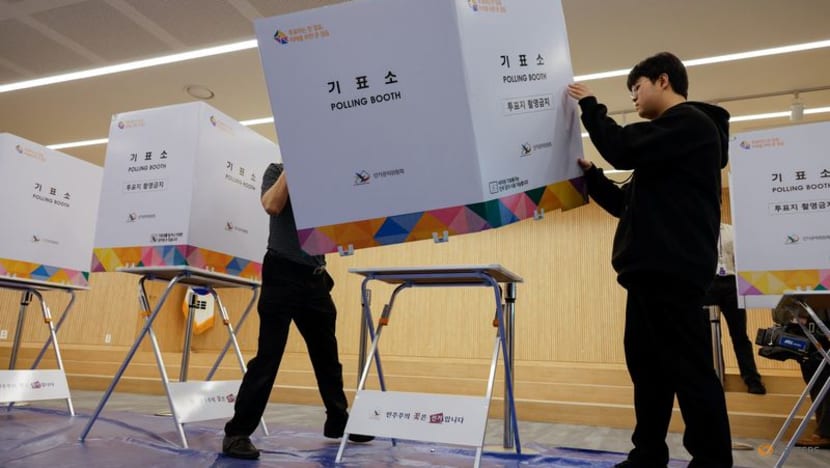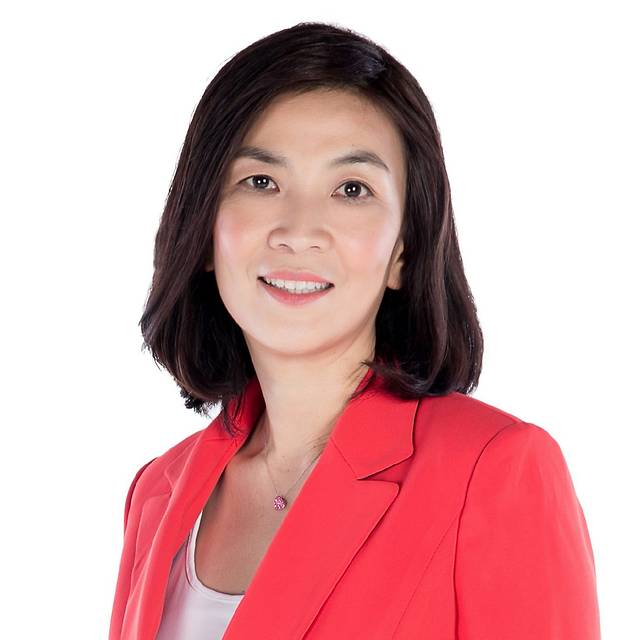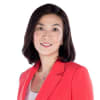Focus on South Korea President Yoon Suk Yeol, cost of living, inflation as country goes to polls
Experts said many of the 44 million eligible voters will not be looking at the policies of individual candidates but at their party affiliation instead.

Government officials sets up a polling booth for the upcoming 22nd parliamentary election at a lifelong learning center in Seoul, South Korea, April 9, 2024. REUTERS/Kim Soo-hyeon
SEOUL: South Koreans will go to the polls on Wednesday (Apr 10) to elect the 300 members of the National Assembly.
Voters will cast one ballot each for their district representative, and also vote for a political party to decide the share of the proportional representative seats in the legislature.
Recent polls show that the two key issues in this election are the cost of living and food inflation, issues that business owner Oh Yong-sook keenly feels.
She has been selling the Korean dish kimbap for about 15 years now, but ingredients are getting more expensive and eating into her profits at a time when the cost of living is increasing.
The 57-year-old said this will influence her vote on election day.
“I don’t look at the party because I think the economy is the most important. As a small business owner, it has been really difficult because of rising costs. So I am hoping someone who can provide some economic help will be elected,” she said.
FOCUS ON PRESIDENT YOON SUK YEOL
Experts said many of the 44 million eligible voters will not be looking at the policies of individual candidates but at their party affiliation instead.
They added that instead of the upcoming parliamentary election being a referendum on current lawmakers, the focus is on President Yoon Suk Yeol.
Foreign policy like South Korea’s relations with the United States or rising threat from North Korea will not be on voters’ minds when they cast their votes.
Instead, it will likely be whether Mr Yoon should be allowed to carry out his policies – or become a lame duck until he leaves office in about three years from now, the observers said.
"The evaluation tends to be overly focused and limited to the president, neglecting proper attention to aspects such as fairness, representation and evaluations of members of parliament. Consequently, critical issues like livelihood concerns, promises, policies and agendas relatively fade into the background,” said Associate Professor of Political Science and Diplomacy Lee Jae-mook.
Assoc Prof Lee, from Hankuk University of Foreign Studies, said a victory for Mr Yoon’s People Power Party is crucial.
"No matter what policy agenda the president tries to implement, he often faces opposition from the legislature, making it difficult to pass legislation,” he said.
“Also, he cannot make policy. Therefore, from the president’s perspective, the goal is for his party to regain a certain number of seats this time and formulate legislative policies."
Related:
VOTERS TURNING TO ALTERNATIVE PARTIES
Elections in South Korea are often dominated by two major parties, the ruling People Power Party led by Mr Han Dong Hoon and the opposition Democratic Party led by Lee Jae Myung, who is on trial for alleged fraud and corruption.
But many Koreans fed up with traditional politics are turning to alternative parties, especially the Rebuilding Korea Party, launched just about five weeks ago by former justice minister Cho Kuk.
Cho Kuk was indicted on charges including bribery and document fraud in 2019, when Mr Yoon was prosecutor-general. He was sentenced to two years' jail but is waiting for an appeals court decision by the Supreme Court.
There are concerns that if his party wins sufficient votes, he could form an alliance with the Democratic Party, making it impossible for Mr Yoon's ruling party to hold a majority in parliament.
"We will be able to first of all, make a lame duck out of the current incumbent government, and then move on to make him (Mr Yoon) a dead duck. I won’t be sure if he will be able to finish his remaining three years in office or not. Our ultimate aim is to make him politically incapacitated. And then finally we’ll see if he can be impeached or not,” Cho Kuk told foreign media during a briefing last month.
Experts said it is the swing voters, mostly in their 20s and 30s, who will determine the outcome of this election.
"As someone from a regional background, I seem to prioritise a bit more the equalisation of development between the capital region and the provinces. And I think it’s important to consider who will be able to bring in more investment, build more things here like cultural facilities, since there is a shortage of such facilities,” said one young voter.
"I was going to look at the agendas and decide. But their pledges don’t seem to resonate much with me. In addition, I don't think it's good for one side to have too much power because then they can act as they please,” said another young voter.
















